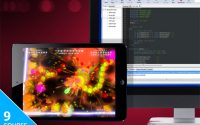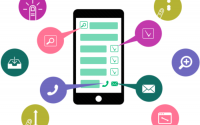Singapore launches TraceTogether mobile app to boost COVID-19 contact tracing efforts – CNA
SINGAPORE: A new mobile application called TraceTogether was launched on Friday (Mar 20) to support ongoing contact tracing efforts amid the COVID-19 outbreak in Singapore.
By downloading the app and consenting to participate in it, TraceTogether allows users to “proactively help” in the contact tracing process, according to a joint press release.
The TraceTogether app, which was developed by the Government Technology Agency (GovTech) in collaboration with MOH over the past eight weeks, can be downloaded by anyone with a Singapore mobile number and a Bluetooth-enabled smartphone.

Users can scan the QR code to download the TraceTogether app on their phone.
After giving consent during the set-up of the app, users will need to turn on their Bluetooth, as well as enable push notifications and location permissions.
The app works by exchanging short-distance Bluetooth signals between phones to detect other users of the app who are in close proximity. Current MOH guidelines define close proximity as two metres apart, or up to five metres, for 30 minutes.
Records of these encounters will be stored locally in the users’ phones and will not be sent to the authorities.
Users will only be asked to share these records when contacted by MOH as part of contact tracing investigations. If they refuse, they may be prosecuted under the Infectious Diseases Act.
Currently, contact tracing relies on the memory of interviewees. However, there have been instances when interviewees could not remember all their contacts or did not have information about people they had been in contact with.
The new app will not replace ongoing contact tracing efforts, but it will facilitate the process, enabling contact tracers to inform users who are close contacts of COVID-19 cases “more quickly”.
Dr Janil Puthucheary, Minister-in-charge of GovTech, said: “The process of contact tracing starts with a recall … and that is the only thing that this app intervenes with. It means that poor memory will no longer slow down the process of contact tracing.”
“In contact tracing process, time matters,” he added, noting that contact tracing remains a key part of the country’s strategy to limit local transmission of COVID-19 and this app will augment the speed at which that occurs.
“The faster the contact tracing process can be initiated and can identify the people at risk, the faster we can intervene and impose quarantine if necessary and limit spread locally,” he told reporters at a press conference on Friday.
For a start, authorities hope to use the app to establish 25 per cent to 50 per cent of these close contacts.
“This enables users to take the necessary action sooner, such as monitoring his own health closely for signs of flu-like symptoms. Early detection could potentially help reduce the risk of the spread of the virus, and better protect our families and loved ones,” the release added.
The Smart Nation and Digital Government Group will be working with the public and private sectors to raise awareness of the app and encourage its adoption.
Speaking at the same press conference, Health Minister Gan Kim Yong said: “This app is very important and we encourage Singaporeans to download it and help us with contact tracing.
“If we are able to be even more effective in contact tracing, then we can be more effective in reducing the risk of local transmission.”
The authorities stressed that the use of the app is voluntary and that users have to give “explicit consent” to participate in TraceTogether.
This consent can be withdrawn anytime, according to GovTech.
The app also has several layers of security and privacy safeguards in place. For example, users will submit only their mobile numbers after downloading the app. Each phone will then be assigned a user ID.
This user ID is then used to generate temporary IDs at regular intervals. It is this temporary ID that is exchanged between the phones of TraceTogether users.
Such regular generation of temporary IDs protect users from eavesdropping and tracking overtime by malicious actors, according to GovTech.
No other personal detail, such as names, will be collected. Neither does the app access a user’s phone contact list or address book.
The app also does not collect or use location data of any kind, such as GPS.
“The app doesn’t identify ‘where’ the exposure to COVID-19 cases may have occurred. It only seeks to establish ‘who’ else might have been exposed to the virus,” according to the TraceTogether website.
This means that location information can only be established by contact tracers during verbal interviews, it added.
All TraceTogether logs will be stored locally on the users’ phone in an encrypted form.
“The logs do not contain the user’s phone numbers but a set of cryptographically generated temporary IDs,” the joint press release said.
“The logs leave his or her phone only when he or she uses the app to send the information to authorities to facilitate contact tracing,” it added.
Even then, the authorities, including MOH and GovTech, have no knowledge of the user’s data as these logs are only deciphered and analysed after the user sends the information.
Other safeguards include how the app will only be active during diseasee outbreaks. For instance after contact tracing ceases, the app will prompt users to deactivate its functionality.
This content was originally published here.


